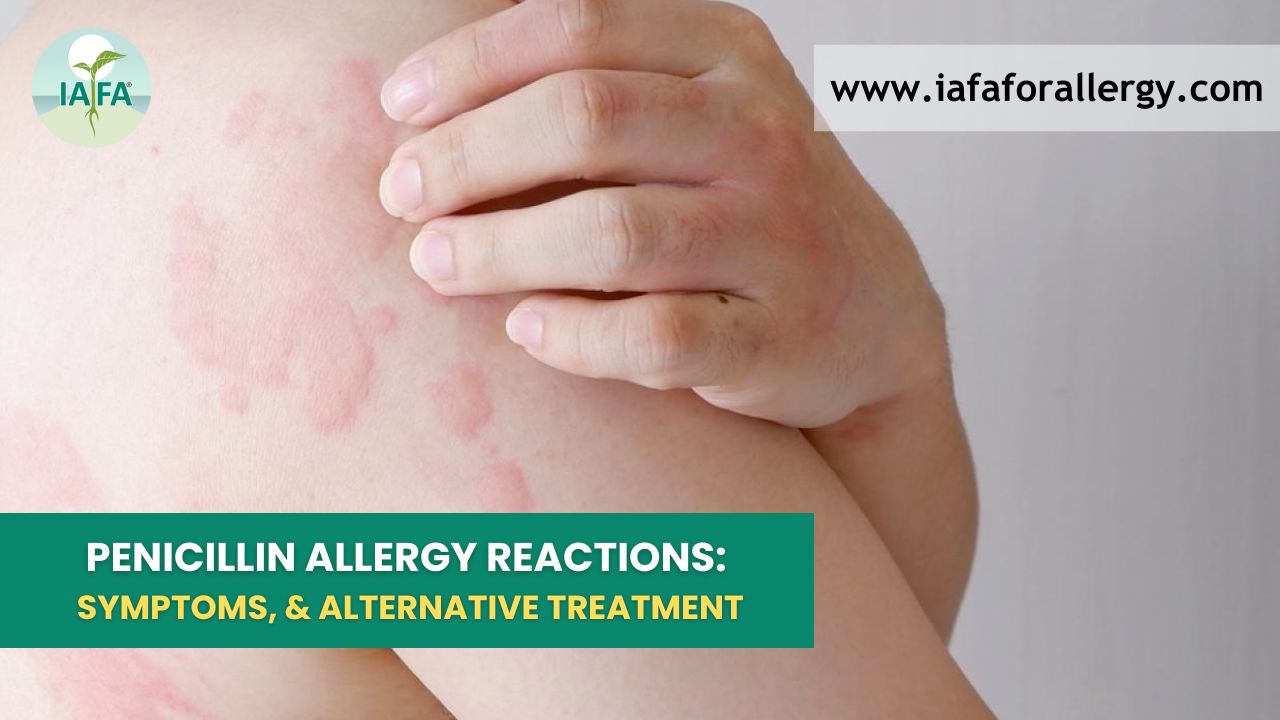Do you know penicillin allergies are relatively common and can be fatal, too? Penicillin is an antibiotic prescribed for different bacterial infections, but a few individuals are allergic to Penicillin and may exhibit signs of allergic reaction after administration of the medicine. In this article, we will learn about allergic reactions to penicillin allergy, antibiotic allergic reactions, penicillin allergy treatment, and much more!
What is Penicillin allergy?
Penicillin allergy refers to a hyperactive response from the immune system when a drug such as Penicillin or other-related antibiotic is administered to an individual. Penicillin is usually prescribed for various bacterial infections. The most common symptoms of penicillin allergy are hives, rash, and itching. It can also result in anaphylaxis, a life-threatening condition involving the whole body.
Ayurvedic Reference of Penicillin Allergy
Ayurveda strongly believes in the concept of “virya”, or the potency of a substance, and the “vipaka”, or post-digestive effect of different substances, including medicines. In penicillin allergy, there is an exaggerated response of the immune system, which can be understood in the following manner.
1. Asatmayta: It means something that is not satmaya or does not nourish or bring pleasure to the body. These products often trigger an allergic response within the body and penicillin allergy can be correlated with this concept.
2. Veerya (Potency): It refers to the inherent quality of a product, and as Penicillin belongs to the antibiotics group, the veerya of this medicine would be Ushan veerya or the one that produces a heating effect in the body.
3. Vipaka (Post-Digestive Effect): It refers to the after-product of a substance after digestion, which means that Penicillin’s vipaka might not be conducive for some people.
4. Prakriti: According to Ayurveda, each individual has a different constitution, and a penicillin allergy can be understood as an individual responding negatively to an antibiotic like Penicillin.
These ayurvedic concepts help to understand the condition, and therefore, a comprehensive treatment can be planned based on these factors.
Symptoms of Penicillin Allergy
Usually, the signs and symptoms of allergic reaction due to Penicillin occur within 60 minutes of administering the drug. However, there is a likelihood that a response can occur even after hours, days, or weeks. The following are the allergy to antibiotic symptoms:
- Rashes on Skin
- Hives
- Itching
- Fever
- Inflammation
- Difficulty in breathing
- Wheezing
- Runny nose
- Itchiness and watering of eyes
- Anaphylaxis is a fatal allergic reaction responsible for the widespread dysfunction of bodily systems. The signs and symptoms of anaphylaxis are tightening of airways and throat, causing difficulty in breathing, nausea or abdominal cramps, vomiting or loose motions, dizziness, fainting, weak or rapid pulse, low BP, and seizures.
Penicillin Allergy Treatment: Ayurveda’s Perspective
Allergic reaction to penicillin treatment involves the evaluation of doshas balance and formulating a treatment plan per the individual constitution of the person. The comprehensive treatment can be divided into two broad categories, namely:
- Herbal Supplements
- Supportive Treatment through diet and lifestyle modification
Herbal Supplements for Penicillin Allergy
Dr. Sahil Gupta at IAFA Ayurveda has conducted thorough research and formulated a few medicines to deal with any allergy, including Penicillin. All the treatments are 100% natural and have the necessary certifications and licenses, which puts a stamp on the efficacy of these products. Let’s discuss which effects are beneficial to managing penicillin allergy. (Note: We recommend booking a consultation with our expert team of doctors for a more tailored treatment based on your specific conditions.)
1. Bhoomi Amla Swaras
This medicine is an extract of the herb named Phyllanthus Niruri, which has been used since ancient times to support the health of the liver and spleen. Bhoomi Amla Swaras is 100% natural and free from potential allergens like wheat, gluten, soy, or eggs.
2. Pitpapra Swaras
The medicine is derived from the extract of Fumaria Indica and is used as a dietary supplement for skin care and wellness. The treatment also supports the digestive system and gastrointestinal health. IAFA’s Pitpapra Swaras is 100% natural and prepared after selecting the most potent herbs.
3. Moti Pishti
This medicine is prepared using moti or pearl, maintains healthy digestion, and supports the well-being of the gastrointestinal tract. Moreover, the treatment helps to balance vitiated Kapha and pitta doshas. Moti Pishti is effective in the management of allergic conditions such as hives, angioedema, and anaphylaxis.
4. Haridrakhandam
Classical Ayurvedic medicine Haridrakhandam is highly effective in managing allergic conditions like hives, rashes, redness, or itching. Infused with the wellness of turmeric, this medicine is outstanding for the direction of any allergy.
Diet and Lifestyle Modifications
Ayurveda supports leading a simple and balanced lifestyle that includes eating freshly cooked meals having all the nutrients, and drinking plenty of water during the day to flush out excessive toxins. Moreover, including yoga and meditation helps to foster a calm demeanor which is essential to keep the doshas in a balanced state. Improving diet and lifestyle helps to speed up the penicillin allergy treatment process.
Conclusion
In the article, we have learned about penicillin allergy and penicillin allergy treatment through Ayurveda and have learned how Ayurveda can help alleviate the symptoms using the right approaches and following all the guidelines.
If you are stressed as you or your loved one is suffering from penicillin allergy or any type of allergy, then you can contact our diligent team of doctors headed by Dr Sahil Gupta. IAFA is one of the most trustworthy and committed institutions to making the world a better place through its original and holistic approach. Dr. Gupta’s team provides effective treatment for all types of allergies using 100% natural and herbal products.
FAQs
Question:- Which Antibiotics cause Allergic Reactions?
Answer:- Many antibiotics can initiate an allergic reaction in many people, including Penicillin and its related drugs like sulpha drugs, cephalosporins, and fluoroquinolones.
Question:- What is the common allergy to antibiotic symptoms?
Answer:- The typical symptoms range from mild rashes, hives, and skin irritation to more anaphylactic severe reactions. Therefore, taking these medicines only under expert guidance and medical monitoring is essential.
Question:- What does an antibiotic reaction rash look like?
Answer:- Rash from antibiotic allergy may look red or pink, flat or raised in an itchy region, and it usually appears within a few hours to a few days of intake of an antibiotic. In more severe infections, it may become a blister or result in skin peeling that requires immediate medical care.








